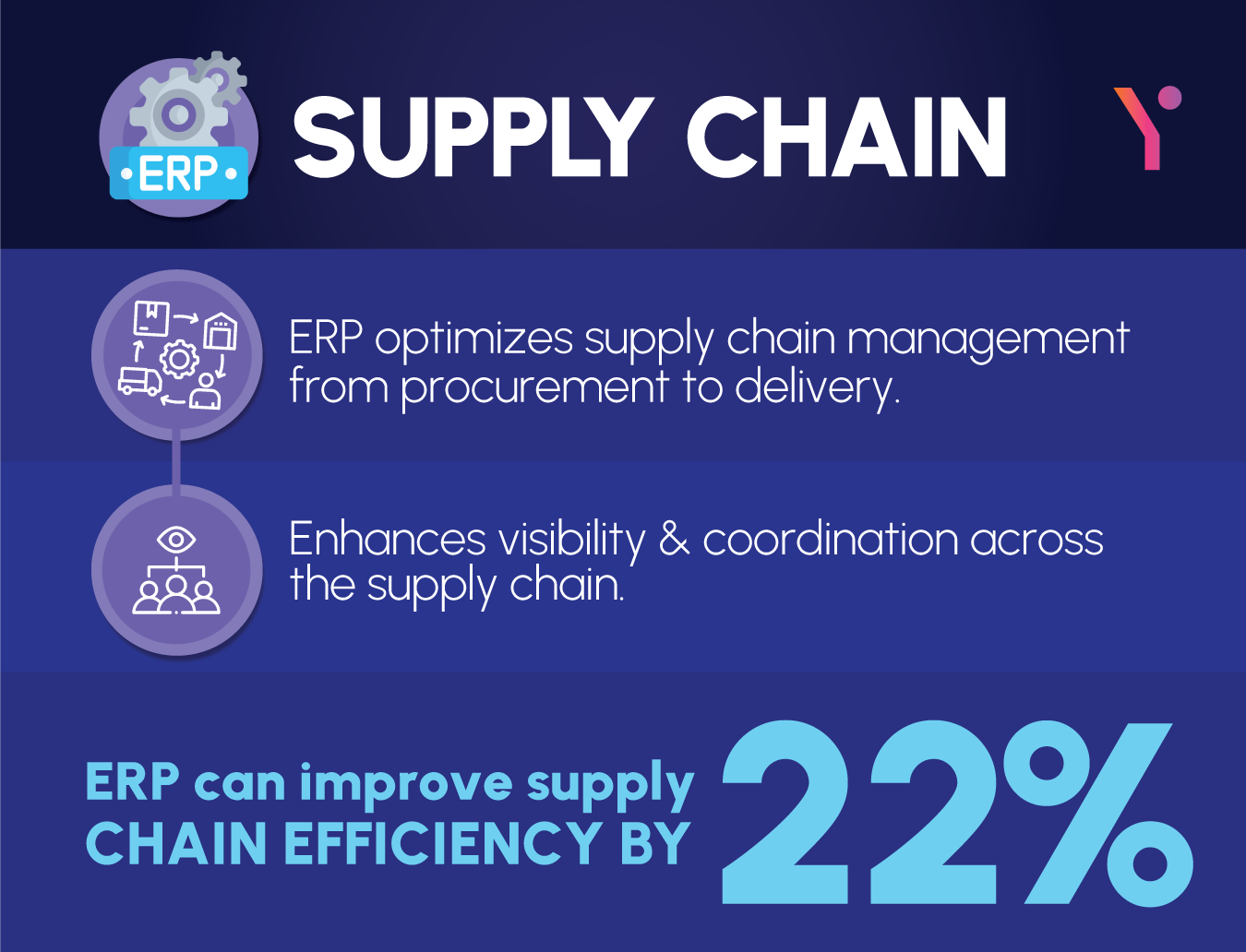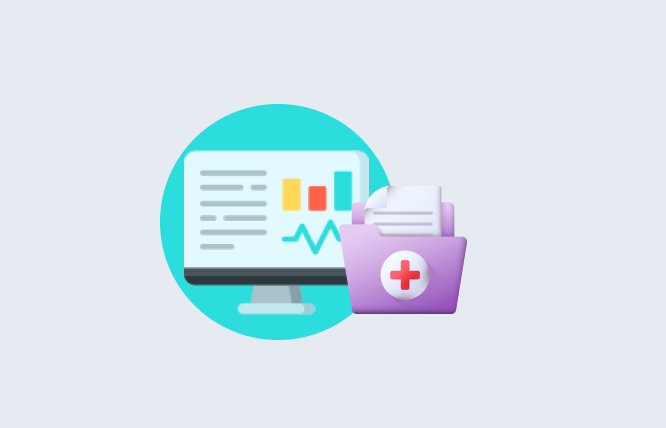Introduction
ERP supply chain systems can optimise operations with modules for analytics, order management, transportation, warehousing, production, and procurement. A proper implementation involves continuous improvement, user training, system configuration, data migration, and careful planning.
Supply Chain Management is widely considered to be a complex function that has seamless coordination of various processes, from procurement to distribution. Across the competitive business landscape throughout the world, organisations are under great pressure to optimise their supply chains for responsiveness, cost-effectiveness, and efficiency. ERP supply chain solutions are a reliable tool for attaining these objectives.
| Supply Chain Challenge | Impact on Business |
Collaboration | Inefficient communication, errors, and delays |
Supply Chain Visibility | Delayed response to disruptions, increased costs |
Demand Forecasting | Lost sales, production inefficiencies, and overstocking |
Inventory Management | Stockouts, carrying costs, and excess inventory |

If you believe that you need further clarification on the points stated above, then simply call FuturByte. We are a globally-recognised ERP software development company that will give you great informational aid. You can also ask us about any subject associated with this blog, such as supply chain management ERP.
Getting to Know Supply Chain Management
A general supply chain has a host of important elements, such as:
Procurement
Acquiring and sourcing components, materials, and services.
Production
Converting raw materials into end products.
Logistics
Controlling, planning and implementing efficient goods flow.
Distribution
Presenting products to potential buyers.
It is generally understood that effective supply chain management demands a holistic view of these components and their interactions. Key performance indicators such as customer satisfaction, inventory turnover, and order fulfilment rate are vital for the measurement of the supply chain performance.
Do you believe that a thorough understanding of any of the elements here can be of great significance to your organisation? If so, don’t hesitate to contact FuturByte. We are a world-renowned serverless web development company that will give you great informational aid, and we would also love to take a close look at your case. You can also ask us about any topic associated with the key subject matter of this blog, such as real-time supply chain analytics.
ERP’s Role in Supply Chain Optimisation
ERP supply chain systems offer a centralised platform for optimising and managing supply chain operations. By integrating a host of supply chain functions, ERP supply chain solutions present enhanced decision-making, improved visibility, and better efficiency.
Supply Chain Collaboration and Visibility
A good degree of collaboration with logistics providers, customers, and suppliers is vital for supply chain success. ERP supply chain systems support collaboration by offering a shared platform for communication and information exchange.
Inventory Optimisation and Management
The management of inventory levels is a complicated balancing activity. ERP supply chain systems assist in maintaining optimal inventory levels by monitoring reorder points, tracking stock levels, and implementing inventory control strategies such as safety stock calculations and ABS analysis.
Demand Planning and Forecasting
Precise demand forecasting is vital for effective supply chain management. ERP supply chain systems make use of statistical models, market trends, and historical data to generate demand forecasts. This assists organisations to optimise inventory levels and production.
Real-Time Data and Analytics
ERP supply chain systems get and analyse data from throughout the supply chain, offering real-time insights into customer demand, production schedules, and inventory levels. This information gives power to businesses so that they can make data-driven decisions and quickly respond to market-related changes.
If you believe that you will do well with more information stated by these points, then you have the option of contacting FuturByte. We are a world-famous microservices design and development company that will be of great assistance to you. You can also inquire on any topic associated with this blog, such as demand forecasting ERP.
Key ERP Modules for Supply Chain
To better manage and optimise a supply chain’s complex operations, ERP supply chain systems incorporate specialised modules. These modules work in tandem to drive supply chain performance and offer comprehensive functionality.
Procurement Management
This is considered to be the bedrock of any supply chain. Procurement involves attaining, sourcing, and managing goods and services. An ERP supply chain system’s procurement module streamlines this process by:
Spend Analysis
Analysing purchasing data to optimise spending and identifying cost-saving opportunities.
Contract Management
Managing supplier contracts, terms, and conditions.
RFQ/RFP Processes
Assisting the request for proposal (RFP) and request for quote (RFQ) for efficient supplier selection.
Order Management and Purchase Requisition
Creating and managing purchase requisitions, producing purchase orders, and tracking their status.
Supplier Management
Maintaining a centralised database for suppliers, and this includes performance metrics and certifications.
Production Planning and Scheduling
Efficient production planning is vital for meeting customer demand while optimising resource utilisation. ERP supply chain systems present production planning and scheduling modules to:
Shop Floor Control
Tracking work-in-progress, managing production activities, and monitoring labour and machine utilisation.
Material Requirements Planning (MRP)
Estimating the precise quantities of materials required for production.
Master Production Scheduling (MPS)
Developing a high-level production plan to fulfil customer orders.
Capacity Planning
Performing an assessment of production capacity and matching it with demand to bypass bottlenecks.
Demand Forecasting
Analyzing historical sales data and market trends to predict future demand.
Warehouse Management
Effective warehouse operations are important for optimising order fulfilment and inventory levels. ERP supply chain systems offer warehouse management modules to:
Cycle Counting and Inventory Accuracy
Perform regular physical inventory counts to make sure there are accurate inventory records.
Shipping and Returns
Generate shipping documents, coordinate outbound shipments, and take care of product returns.
Picking and Packing
Optimise order picking processes, packaging products for shipment, and creating picking lists.
Receiving and Put-Away
Verify quantities, manage incoming goods, and store items in designated locations.
Inventory Control
Track inventory movements, locations, and levels in the warehouse.
Transportation and Logistics
Productive transportation and logistics management is vital for delivering products on time and at the lowest possible cost. ERP supply chain systems present transportation and logistics modules for:
Delivery Management
Managing appointments, delivery schedules, and proof of delivery.
Shipment Tracking
Monitoring shipment progress and offering real-time visibility.
Freight Management
Performing the planning and execution of freight movements, including routing optimisation and load planning.
Carrier Management
Managing transportation carrier-related relationships and negotiating rates.
Order Management
Efficient order management is directly related to a good degree of customer satisfaction. ERP supply chain systems can take care of order management, fulfilment, and processing, including:
Returns Management
Taking care of product returns, initiating return processing, and issuing refunds.
Order Status Tracking
Offering customers real-time information regarding order status.
Order Fulfilment
Coordinating order shipping, picking, and packing activities.
Order Entry and Processing
Capturing customer orders, creating sales orders, and verifying order availability.
Supply Chain Analytics
Data-driven decision-making is vital for supply chain optimisation. ERP supply chain systems offer complex analytics capabilities for the purpose of:
Transportation Optimisation
Performing analysis of transportation routes and costs to identify savings opportunities.
Inventory Optimisation
Identifying opportunities to improve inventory turnover and decrease inventory levels.
Demand Forecasting
Analysing historical data to predict potential future demand patterns.
Performance Measurement
Tracking key performance indicators (KPIs) to perform supply chain performance assessment.
Implementing ERP for Supply Chain Optimisation
The implementation of an ERP supply chain system is considered to be a strategic initiative that demands thoughtful planning and execution. These are the steps that outline important phases of an ERP implementation project:
Project Initiation and Planning
State project scope, objectives, and goals. Amass a cross-functional project team and create a project plan.
Analysis of Business Process
Analyse the present supply chain processes to identify areas for improvement and inefficiencies.
ERP System Selection
Perform evaluation of a host of ERP supply chain solutions, depending on vendor support, cost, and functionality.
Data Migration and Cleansing
Transfer associated data from legacy systems to the ERP system, making sure there is data consistency and accuracy.
System Configuration
Customise the ERP system to match the organisation’s particular business processes and requirements.
User Training and Adoption
Develop training programs to equip the workforce with the required skills so that they can effectively use the ERP system.
Go-Live and Testing
Apply the ERP system and perform thorough testing to ensure data integrity and system functionality.
Post-Implementation Support and Optimisation
Offer ongoing support to users, note opportunities for continuous improvement, and monitor system performance.
When a given organisation follows the above-stated steps and leverages the capabilities of ERP supply chain modules, it can attain prominent improvements in supply chain performance, visibility, and efficiency.
Concluding Remarks
ERP supply chain systems are considered to be essential tools for today’s modern businesses that are looking to optimise their supply chain operations. By presenting integrated functionalities, advanced analytics, and real-time visibility, ERP supply chain solutions give power to organisations so that they can improve efficiency, decrease costs, improve customer satisfaction, and make informed decisions.
Truly, investment in an ERP supply chain system is considered to be a strategic move that can bring forth prominent returns on investment. This is why, by accepting technology and going with a holistic approach to supply chain management, today’s businesses can stand in a better position to enjoy a competitive edge in today’s highly dynamic market.
Finally, if you believe that you have trouble understanding any point stated in this blog or care to know any point in further detail, then feel free to contact FuturByte. We are a world-renowned software developer known for manufacturing ERP, and we will give you excellent informational aid. You can also query us on topics that are trendy nowadays, such as on a cloud POS system.
Frequently Asked Questions
ERP systems are known to integrate and streamline a host of supply chain functions, from procurement and inventory to production and distribution, enhancing decision-making and efficiency.
ERP solutions centralise supplier data, making way for better collaboration, performance evaluation, and communication. This fosters optimised procurement processes and stronger partnerships.
ERP systems track compliance, resource consumption, and environmental impacts. This data improves supply chain transparency, decreases waste, and supports sustainable initiatives.
By connecting a host of supply chain stages, ERP offers real-time data on logistics, production schedules, and inventory levels. This decreases stockouts, improves decision-making, and improves overall efficiency.
Have questions or feedback?
Get in touch with us and we‘l get back to you and help as soon as we can!




